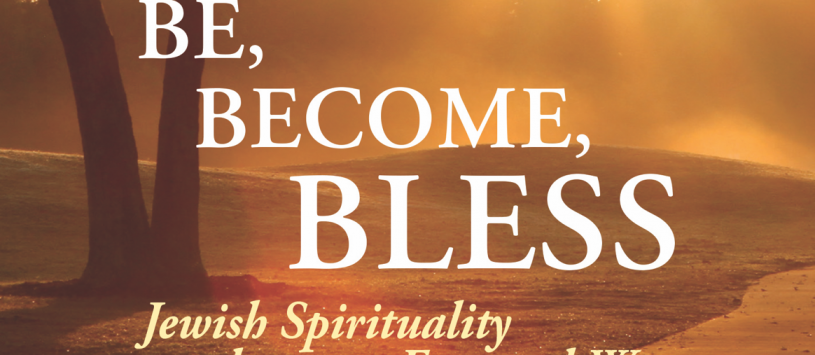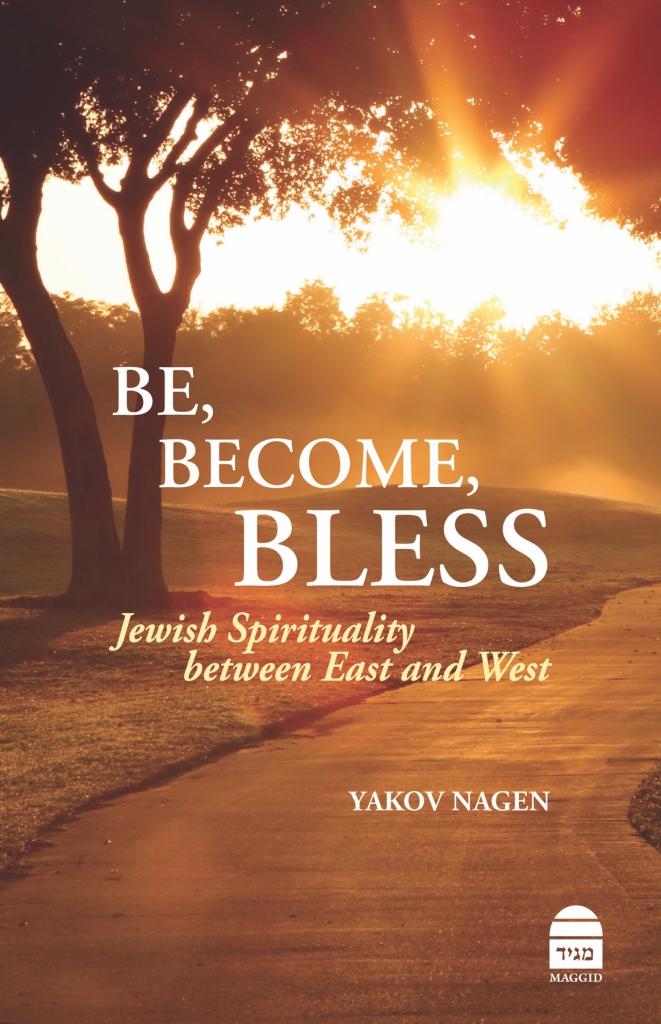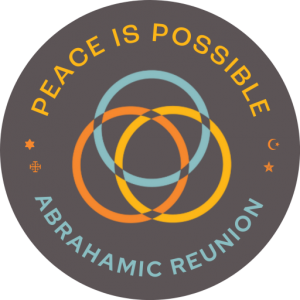

Book Release:
BE, BECOME, BLESS: Jewish
Spirituality Between East & West

by Rabbi Dr. Yakov Nagen AR Peacemaker & Israel Board Co-Chair
“Be, Become, Bless is an important book, offering insights into Torah and the East that are profound, accessible, and transformative. Rabbi Nagen’s style is compelling, and his love of people, truth, and wisdom is apparent again and again and again.
– Rabbi Joseph Telushkin, Author of Jewish Literacy, Rebbe, and Words that Hurt, Words that Heal
From the Press Release:
The thirst for spirituality and meaning is a defining characteristic of our times. A societal shift is taking place, one that emphasizes experience, feeling, and imagination.
BE, BECOME, BLESS presents a Jewish approach to transforming how we see and live our lives. Here, Rabbi Nagen uses the weekly parasha as a springboard to converse with both Eastern spirituality and Western thinking, creating a synthesis that unifies “being” and “doing.” Thought-provoking and original, this work draws on wisdom from the Bible, Talmud, Kabbala, as well as philosophy, poetry, literature, music, and film. Rich with stories and insights from the author’s personal journey, BE, BECOME, BLESSseeks to guide its readers to discover their own path to fulfillment.
BE, BECOME, BLESS is published by Maggid Books, a division of Koren Publishers Jerusalem that offers new approaches to Jewish text and themes from the world’s leading rabbis, scholars, and philosophers. This title is published in partnership with Otniel Yeshiva.
RABBI YAKOV NAGEN is originally from New York City and now resides in Israel. He has a PhD in Jewish philosophy from Hebrew University and is a senior educator at the Otniel Yeshiva in Israel, where he teaches Talmud and Kabbala. He is a leading figure in interfaith dialogue between Judaism and Islam and in encounters between Judaism and Eastern religions. Many of his writings have been translated into Chinese, and he has lectured in Beijing and Shanghai. Nagen was profiled in Tablet magazine as one of the ten “Israeli Rabbis You Should Know.”
Special price: Get 20% off + free shipping of Be, Become, Bless! Go to maggidbooks.com and use promo code BBB20 . Offer valid until November 30, 2019. Valid in the US & Canada only.
Excerpts From BE, BECOME, BLESS
God Is Other People
The Zohar, or the Book of Splendor, is named for the inner dimension of reality, which Kabbalah identifies with the divine. The book instructs its readers to encounter this hidden splendor and recognize God in it, a meeting that leads to enlightenment. One of the great contributions of the Zohar is the perception that the divine interpenetrates life itself, including individual people, in their relationships with the world and with others. Contrary to mystical modes of consciousness that seek to break with the world and transcend it, the Zohar proposes a relationship with the divine that connects the earthly and supernal realities. The journey to God, according to the Zohar, passes through interpersonal relationships: from a couple’s intimate bond to the mundane interactions between the individual and the community. Much of the book consists of conversations between friends, who encounter the Torah through studying, traveling, and generally spending time together. Quietist outlooks, by which one walls oneself off from the world, are foreign to Judaism – and particularly to the Zohar. The crucial point is that transcendence lies within life, not beyond it.
Shattered Vessels, Broken People
At the end of the parsha is the story of the Akedah (the binding of Isaac). The Torah does not say why God decides to test Abraham, and both the Midrash and the Zohar attempt to explain what transpired beforehand. The difference between the Midrash’s straightforward explanation and the Zohar’s esoteric approach can help elucidate the novel message of Kabbalah. Both interpretations explain the test of the Akedah, which ultimately brought Abraham closer to God, as a reaction to Abraham refraining from giving something to God and thus damaging his relationship with Him. Consequently, Abraham is tested with the ultimate demand – to give his only son. Let us look over the sources to see how they characterize Abraham’s earlier sin and the thing that he refrained from giving.
Here is the Midrash, as quoted by Rashi:
“After these things” (Genesis 22:1): Some of our sages say (Sanhedrin 89b) [that it happened] after the words of Satan, who was accusing and saying “Of every feast that Abraham made, he did not sacrifice before You one bull or one ram!” [God] said to him, “Does he do anything but for his son? Yet, if I were to say to him, ‘Sacrifice him before Me,’ he would not withhold [him].”
According to the Midrash, Abraham celebrates Isaac’s weaning, but does not offer God a sacrifice of thanks. Abraham’s sin is forgetting to show gratitude to God. Satan seizes the opportunity and describes the error as the symptom of a rift between Abraham and God, who thus decides to test Abraham with the Akedah.
The Zohar has a different interpretation:
Rabbi Shimon opened, saying: Whoever rejoices on the festivals without giving the blessed Holy One His share – that evil-eyed Satan hates him and accuses him and removes him from this world…. The share of the blessed Holy One consists in gladdening the poor as best as one can. For on these days the blessed Holy One comes to see those broken vessels of His. Entering their company and seeing they have nothing to celebrate, He weeps over them – and then ascends to destroy the world! Many members of the Academy come before Him and plead: “Master of the universe! You are called Compassionate and Gracious. May Your compassion be aroused for Your children!” He answers them, “Do not the inhabitants of the world realize that I based the world solely on love? As it is written: I said, ‘The world shall be built on love (Psalms 89:3).’ By this the world endures.” (Zohar, Hakdamot 10b)
Later, according to the Zohar, Satan arrives at Abraham’s celebratory banquet disguised as a pauper. No one notices him, and he comes before the Lord to denounce Abraham: “Master of the universe, You called Abraham ‘My beloved’ (Isaiah 41:8)? He held a feast and gave me nothing, and nothing to the poor.” Abraham’s is a social transgression: he disregards the poor. Unlike the Midrash, which focuses on the direct dialogue between Abraham and his Maker, the Zohar takes in the entire human vista, where the encounter with the infinite God takes place.
Here, the idea of “shattered vessels” is described as the cause of all privation. Prior to it, everything was harmonious, and the vessels received direct divine light; however, a fault in the process of Creation caused the vessels to shatter, and their sparks to be strewn throughout the cosmos (thus turning the entire cosmos into a divine space). Humanity’s purpose is to repair the vessels, and to reveal and raise up the sparks. The shattered vessels are people; each contains a lost divine spark. The individual is repaired through contending with human want, which is in fact divine want. The Zohar explains that in giving to the poor one is not merely fulfilling an interpersonal mitzvah, but rather giving to God Himself. The human realm and its privations are part and parcel of the divine realm, and Abraham’s status as God’s beloved thus depends on his treatment of the other, of the poor.
The social implications of the myth of the shattering of the vessels are further elucidated in the thought of one of the preeminent kabbalists of the twentieth century, Rabbi Yehuda Ashlag. To him, the shattering of the vessels is an expression of the damage wrought by an unjust distribution of wealth, a reality that corrupts the world, including the rich. In 1958, then-prime minister David Ben-Gurion wrote to Yehuda Tzvi Brandwein, a close disciple of the rabbi: “[Rabbi Ashlag] asked me on many occasions after the establishment of the state whether we would institute a communist regime.” Later, when he learned of the atrocities perpetrated in the Soviet Union, he became disillusioned with communism and renounced his vision of a just distribution that could be effected through politics.

